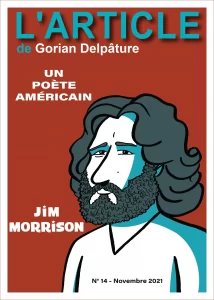Foreword by Gorian Delpâture
It took me more than twenty years to write this book. This is obviously not about the duration of the writing itself. As you can imagine, I do not compete in the same literary category as Marcel Proust and other James Joyce. No. Twenty years passed between my first serious listening to the Doors and the project for this primer. I knew the band before listening to it. I had seen posters of shirtless Jim Morrison. I had seen shirtless Jim Morrison T-shirts. I knew he died at 27. I knew there was a connection between the band and drugs. I did not want to watch the first broadcast of Oliver Stone’s film on Belgian television because I did not want to support this story of “dirty drug addicts”. But I had also discovered that the Doors singer had written books. I particularly remember the cover of a paperback book called “An American Prayer and Other Writings” where Morrison appeared bearded and dressed for once. This book that a classmate from the athenaeum was reading intrigued me. These drug addicts knew how to write? Also, one day in the summer of 1994, I bought a cassette (yes, it does not make us any younger!) of the Doors. It was a Luxembourg pirated copy of their debut album with the songs out of order. I listened to it on the beach. It was not the one in Venice where Morrison sang for the first time in front of Ray Manzarek, it was the one in La Panne at the North Sea, but I really like this coincidence. And what a revelation. That almost frightening voice that urged me to “light the fire” and “escape to the other side”; this long epic fresco mixing “the end of all that exists”, Oedipus and a serpent seven miles long; this music alternating the best rock, carnival tunes, jazz and sitar; I had never heard of anything like it. And that was only the first album! There were five more with “strange people”, an “unknown soldier”, a “sweet parade”, “a spy” and a “changeling”. There were concerts with an enigmatic “celebration of the lizard”. There were these photos of the musicians: a bespectacled keyboardist who seemed to be deciphering ancient mysteries on his keys, a blank-eyed, messy-haired guitarist who seemed to wander the stage, this highly focused drummer who never smiled. And this singer with his hair done like Alexandre Le Grand. These four young men stood out. In their time in the 60s. And still when I discovered them thirty years later. And there were poetry books written by the lead singer of the band. Far from being a simple shirtless drug addict, he was above all a great lover of books who quoted Arthur Rimbaud and Friedrich Nietzsche in interviews. They copied William Blake, Louis-Ferdinand Céline, Anaïs Nin and James George Frazer in their lyrics. What a surprise. I had never met literate rockers, such cultured musicians. After all, two out of four Doors members were college students. I bought everything. Seen everything. And read everything. What Jim Morrison wrote and what was written about him. Thousands of pages slowly digested over twenty years. There were good and bad. Factual and fanciful. Complete and incomplete. But no work that really satisfies me. A book that would tell (almost) everything with cross-referenced information, a text that would explain the literary references of the songs, a document that would not stop at Morrison’s death in Paris in July 1971 but would continue to tell the story of the survivors. This book did not exist. It had to be written. With all the information amassed in my library and curiously preserved in my memory since that first listening on the beach, I could do it. To paraphrase Morrison, it is like “a bowstring bent for 20 years and suddenly let go. The result is in your hands. This primer, I hope, will teach even the most hardcore Doors fans. And he might explain to others why this shirtless man still appears on the T-shirts of teenagers whose parents might not even have been born when the Doors ruled the American charts.
Gorian Delpâture


